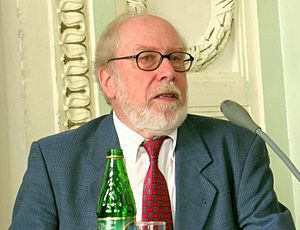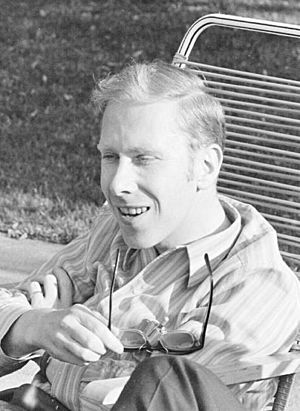Niklaus Wirth facts for kids
Quick facts for kids
Niklaus Wirth
|
|
|---|---|

Wirth in 2005
|
|
| Born |
Niklaus Emil Wirth
15 February 1934 Winterthur, Switzerland
|
| Died | 1 January 2024 (aged 89) |
| Citizenship | Switzerland |
| Education |
|
| Known for | ALGOL W, Euler, Pascal, Modula, Modula-2, Oberon, Oberon-2, Oberon-07, Oberon System |
| Awards |
|
| Scientific career | |
| Fields | Computer science |
| Institutions |
|
| Thesis | A Generalization of Algol (1963) |
| Doctoral advisor | Harry Huskey, Edward Feigenbaum |
| Doctoral students | Martin Odersky, William Marshall McKeeman, Peter U. Schulthess, Edouard Marmier, Rudolf Schild, Michael Franz |
| Signature | |
 |
|
Niklaus Emil Wirth (born February 15, 1934 – died January 1, 2024) was a brilliant computer scientist from Switzerland. He created many important programming languages, like Pascal. These languages help computers understand what we want them to do.
In 1984, he won the Turing Award. This award is like the Nobel Prize for computer science. He received it for making many new and helpful computer languages.
About Niklaus Wirth
Niklaus Emil Wirth was born in Winterthur, Switzerland, on February 15, 1934. He loved learning about electronics and computers.
He studied at the Swiss Federal Institute of Technology Zürich (ETH Zürich). In 1959, he earned a degree in electronic engineering. He then got another degree from Université Laval in Canada in 1960.
Later, in 1963, he earned his PhD from the University of California, Berkeley. His main teacher there was Harry Huskey, who was a pioneer in computer design.
After finishing his studies, Wirth taught computer science. He was a professor at Stanford University and the University of Zurich. In 1968, he became a professor at ETH Zürich, where he worked until he retired in 1999.
He also spent time at Xerox PARC in California. This was a famous research center where many new computer ideas were born.
In 2004, he was honored by the Computer History Museum. They recognized his important work in programming languages and algorithms.
Niklaus Wirth passed away on January 1, 2024, when he was 89 years old.
Computer Languages He Created
Niklaus Wirth was the main designer of many programming languages. These are special codes that tell computers what to do. Some of his famous languages include:
- Euler (1965)
- ALGOL W (1966)
- Pascal (1970)
- Modula (1975)
- Modula-2 (1978)
- Oberon (1987)
Pascal became very popular for teaching computer programming. Many students learned to code using Pascal.
He also helped create computer operating systems. These are the main programs that run a computer. Examples include Medos-2 and Oberon. He also worked on systems for designing computer hardware.
In 1984, he received the Turing Award for all his work on these languages. This award is one of the highest honors in computer science.
His Books and Ideas
Niklaus Wirth wrote several important books about computer science. These books helped many people learn about programming.
One of his most famous books was The Pascal User Manual and Report. He wrote it with Kathleen Jensen. This book was used by many people to create Pascal programs in the 1970s and 1980s.
He also wrote an important article called Program Development by Stepwise Refinement. This article taught people how to build computer programs step by step. It is still considered a classic in software engineering.
In 1975, he wrote the book Algorithms + Data Structures = Programs. This book became very well known. He updated it later with new examples using his other languages, Modula-2 and Oberon.
Another textbook he wrote was Systematic Programming: An Introduction. This book helped people who loved math understand how programming works. It was a challenging but very useful book for those interested in computer science.
In 1992, he and Jürg Gutknecht published a full guide to the Oberon OS. This helped people understand and use the Oberon operating system.
Wirth's Law
In 1995, Niklaus Wirth shared an interesting idea called Wirth's law. This law says that computer software often gets slower faster than computer hardware gets faster.
This means that even though computers become more powerful, programs can still feel slow. This is because software often becomes more complex and uses more resources. He mentioned this idea in his paper "A Plea for Lean Software."
See also
 In Spanish: Niklaus Wirth para niños
In Spanish: Niklaus Wirth para niños
- 21655 Niklauswirth asteroid
- Extended Backus–Naur form
- Wirth syntax notation
- Bucky bit
- Wirth–Weber precedence relationship
- List of pioneers in computer science
 | Claudette Colvin |
 | Myrlie Evers-Williams |
 | Alberta Odell Jones |


